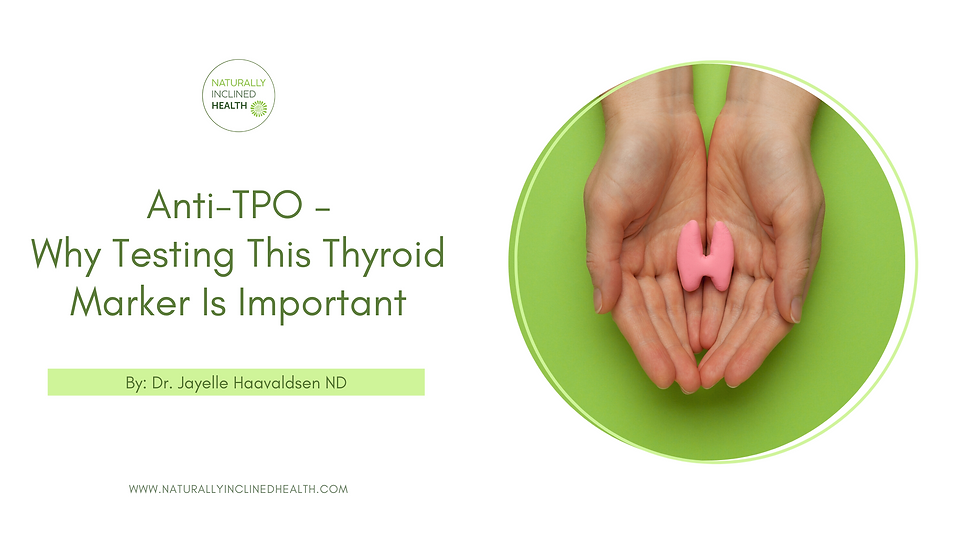Anti-TPO – Why Testing This Thyroid Marker Is Important
- Dr. Jayelle Haavaldsen, ND

- Nov 9, 2022
- 5 min read
Updated: Mar 1, 2025

When we talk about “hormone health”, I think people most commonly think about reproductive hormones like estrogen and progesterone. Today we’re going to switch gears and talk about some different hormones that have a major impact on our whole health: your THYROID hormones! Specifically, I want to talk about thyroid autoimmunity and why it matters so much, and why it is often the missing piece of information in health care plans.
At Naturally Inclined Health, we regularly work with patients who are having menstrual issues, who are struggling with fertility, or have debilitating fatigue. What do those have in common? In all these instances, we should be doing an in-depth look at the thyroid and screening for thyroid autoimmunity.
Before I fully dive into thyroid autoimmunity, I’d like to take a second to explain to you what your thyroid is and what hormones are involved. This part will help you understand this crucial organ and get a better understanding of your own thyroid lab work.
First off, know that your thyroid is a small gland in your neck that releases hormones that act on every single cell on your body. Your thyroid controls metabolism, energy production and growth. It will affect things such as your heart rate, your energy levels, your temperature, your weight, and much more. Your thyroid gland will modify its production of hormone in response to the external environment – when the body is in a state of stress, it slows things down to try and conserve important energy stores. When our thyroid is under functioning, we don’t feel good.
Thyroid stimulating hormone (TSH) – This is the hormone your pituitary gland (found at the base of the brain) releases to tell your thyroid what to do. When having their thyroid assessed, most people have only had their TSH tested. When this number is high, it means the thyroid is under-functioning (hypothyroidism). If this number is low, it means the thyroid is overactive. The way general thyroid screening works in most healthcare systems is that if it comes back normal, no further testing is done. This might be okay for most people, but there are many people with underlying thyroid issues that are still being missed with this way of testing. Keep reading to find out why.
T3, T4 – These are the hormones that are released by your thyroid. Your thyroid mostly releases T4 into your bloodstream and T4 is converted into the highly active T3 as it is needed by your body. Thyroid hormones influence how almost every cell in our body works – needless to say, it is important.
What Is Autoimmune Hypothyroidism? How Do We Test It?
Hypothyroidism is a condition where the thyroid gland no longer produces enough thyroid hormone to meet the body’s needs. Hypothyroidism specifically caused by autoimmune destruction of the thyroid gland is called Hashimoto’s disease, and it is the most common cause of hypothyroidism.
When your body sees something as foreign, it creates antibodies which help signal your immune system to destroy it – it is a beautiful system when it works, but sometimes your body mistakes your own cells as foreign and attacks it – this is the basis of any autoimmune disease.
This is where anti-TPO antibodies come in.
Anti-TPO antibodies however are antibodies against a critical enzyme (TPO, short for thyroid peroxidase) in your thyroid, and their presence in the bloodstream indicates an autoimmune attack on the thyroid.
What are the symptoms of Hashimotos?
Autoimmune hypothyroidism doesn’t particularly look different than other forms of hypothyroidism. Typical symptoms are:
· Fatigue, even with enough sleep
· Constipation
· Cold temperature
· Irregular menstruation
· Miscarriages
· Hair thinning and hair loss (scalp, eyebrows, body)
· Unexpected weight gain
· Low mood and depression
· Symptoms that start after childbirth *
*Thyroid issues that develop after childbirth are relatively common, however they are commonly missed as the symptoms are passed off as a normal part of motherhood. If you experience these symptoms that persist 6 weeks after giving birth, PLEASE don’t let anyone tell you it is simply normal. Investigation is warranted.
Here are a couple important things to know:
1) The presence of anti-TPO antibodies will almost ALWAYS precede hypothyroidism. Meaning, screening for this even when the other thyroid markers are “normal” could help us catch this early, before it develops in hypothyroidism.
2) Even if your thyroid function is still normal, the presence of the anti-TPO antibodies affects your health. You may have increased risk of miscarriage, fertility issues, menstrual irregularities, mood disruptions, depression, other autoimmune diseases and more. Therefore, knowing if you have these antibodies can change the direction of your care.
3) Most people have never been tested for anti-TPO antibodies, even if they have hypothyroidism. By this point you should be scratching your head and saying “why not?”. Well, because if you are looking at medications as your only treatment option, then knowing if you have Hashimoto’s won’t change anything. The pharmaceutical treatment for hypothyroidism is Synthroid (synthetic T4), regardless of if it is autoimmune or not. But, I am here to scream from the rooftops to say that, yes, the medication is an important part of the treatment plan but there is SO much more that can be done for Hashimoto’s. See below.
4) How does a naturopathic doctor support someone with Hashimoto’s?
It isn’t uncommon for someone to start medication for hypothyroidism, only to report they don’t feel much better. That is typically because the whole problem is not being addressed. A naturopathic doctor takes a holistic approach, and so while the focus would be on improving thyroid health but also supports the immune system in order to reduce the inflammation associated with the autoimmune process. This would look like dietary and lifestyle practices and the use of vitamins, minerals, and herbs to improve thyroid function and reduce inflammation. Some specific nutrients for thyroid support include inositol and selenium, just to name a few. I would highly recommend working with your naturopathic doctor to ensure safe and effective dosing.
To sum it up – your thyroid has a major impact on your health. Thyroid autoimmunity is easy to assess for but often undiagnosed. Knowing about it can change the course of your treatment plan and ultimately your health outcomes. Please consult with your healthcare provider to understand your options and make the best choice for your health.
*Disclaimer: The information contained within this post is for general educational and information purposes only, no doctor-patient relationship is formed. It is not professional medical advice, diagnosis, treatment, or care nor is it intended to be a substitute therefore. If you have any concerns or questions about your health, always seek the advice of a qualified healthcare professional.
References:
Pace C, Tumino D, Russo M, Le Moli R, Naselli A, Borzì G, Malandrino P, Frasca F. Role of selenium and myo-inositol supplementation on autoimmune thyroiditis progression. Endocr J. 2020 Nov 28;67(11):1093-1098. doi: 10.1507/endocrj.EJ20-0062. Epub 2020 Jul 15. PMID: 32669509.
Fallahi P, Ferrari SM, Elia G, Ragusa F, Paparo SR, Caruso C, Guglielmi G, Antonelli A. Myo-inositol in autoimmune thyroiditis, and hypothyroidism. Rev Endocr Metab Disord. 2018 Dec;19(4):349-354. doi: 10.1007/s11154-018-9477-9. PMID: 30506520.
Ucan B, Sahin M, Sayki Arslan M, Colak Bozkurt N, Kizilgul M, Güngünes A, Cakal E, Ozbek M. Vitamin D Treatment in Patients with Hashimoto's Thyroiditis may Decrease the Development of Hypothyroidism. Int J Vitam Nutr Res. 2016 Feb;86(1-2):9-17. doi: 10.1024/0300-9831/a000269. Epub 2017 Jul 12. PMID: 28697689.
Xie J, Jiang L, Sadhukhan A, Yang S, Yao Q, Zhou P, Rao J, Jin M. Effect of antithyroid antibodies on women with recurrent miscarriage: A meta-analysis. Am J Reprod Immunol. 2020 Jun;83(6):e13238. doi: 10.1111/aji.13238. Epub 2020 Apr 11. PMID: 32198952; PMCID: PMC7317526.




Comments